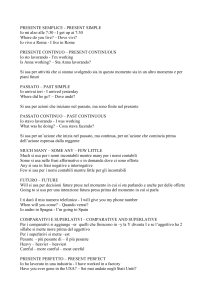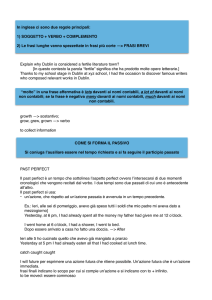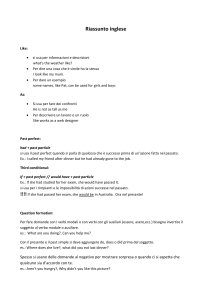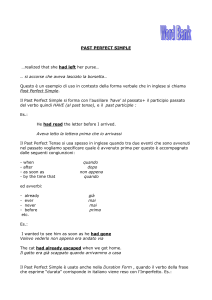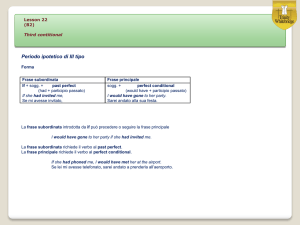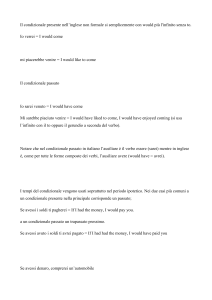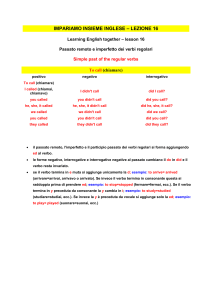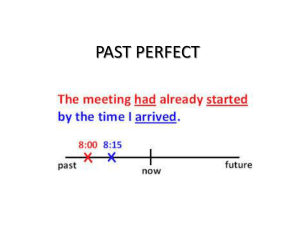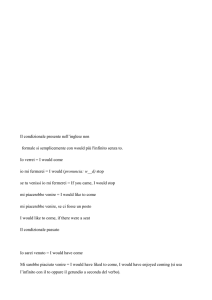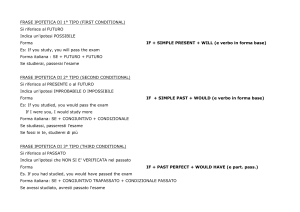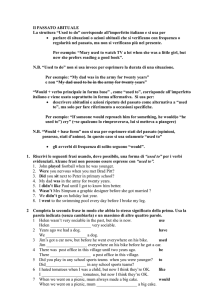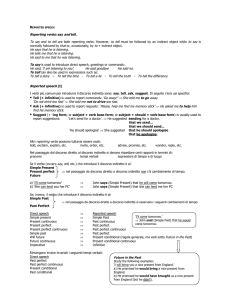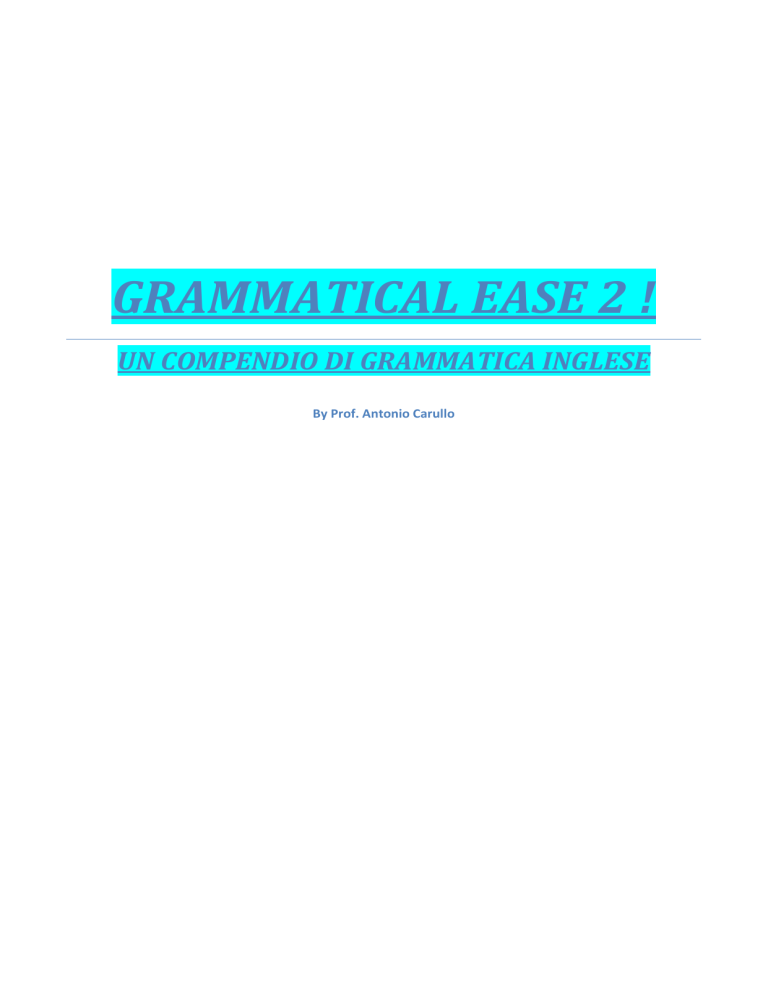
GRAMMATICAL EASE 2 !
UN COMPENDIO DI GRAMMATICA INGLESE
By Prof. Antonio Carullo
INTRODUZIONE
Questo mio lavoro è una naturale prosecuzione, nonché completamento,
della raccolta di materiale utilizzato in classe in scuole di vari ordini e
gradi, il cui scopo è, meramente, come nel primo testo, fornire uno
strumento semplice e di rapida consultazione a chi s’avvicina alla lingua
Inglese compresi alunni che svolgono una programmazione differenziata.
Inoltre, intendo così rendere il più facile possibile la comprensione degli
elementi basilari della stessa. Questo compendio inizia laddove terminava
il precedente ossia con i vari tempi del passato inglese.
Il compendio è diviso in sezioni: nella prima c’è una grammatica
essenziale; nella seconda brani scelti da utilizzare come letture e per
esercitazioni; nella terza alcuni esempi di test; ed infine non potevano
assolutamente mancare un elenco di verbi irregolari, che ogni studente di
Inglese che si rispetti deve conoscere a menadito se intende davvero
imparare la lingua, e un elenco di verbi frasali.
____________________________________________________________
Tutti i diritti letterari ed artistici sono riservati.
Nessuna parte può essere riprodotta, in alcun modo,
senza specifica autorizzazione scritta dell’autore.
2
Distribuzione gratuita.
Finito di stampare nell’Agosto 2010.
THE PRESENT PERFECT
Il Present Perfect è il tempo inglese che indica un’azione che, anche se
svolta nel passato, ha dei legami con il presente. Questi legami riguardano:
quando l’azione si è svolta e, la stessa azione, che non è ancora completa
mentre si parla o si scrive.
Il Present Perfect è un tempo composto che utilizza l’ausiliare To Have al
Simple
Present
ed
il
Participio
Passato
del
verbo
principale.
E’ To Have che si coniuga mentre il verbo principale resta sempre al
participio passato.
Si usa il Present Perfect:
1) quando l’azione si è svolta in un tempo passato imprecisato.
Esempio: Ho mangiato il panino. = I have eaten the sandwich ( non
specifico quando s’è compiuto l’evento ).
2) quando l’azione iniziata in un preciso momento del passato non si è
ancora completata al momento in cui ne parlo o scrivo.
3
Esempio: Ho mangiato il panino stasera. = I have eaten the sandwich
this evening ( il tempo dell’azione non è ancora concluso ).
3) quando in una frase al passato è utilizzato uno dei seguenti avverbi di
tempo: recently (recentemente), lately (ultimamente), already (già),
just (appena), just (appena), ever (mai, in frasi interrogative), never
(mai, in frasi negative), yet (che significa “ancora” in frasi negative,
e “già” in quelle interrogative).
Va ricordato che already, just, ever, never si mettono tra l'ausiliare to
have e il verbo principale, mentre yet, recently, lately si collocano
alla fine della frase.
Esempi:
Matthew has just finished his homework.
Justin hasn’t already called.
Sam has never been to the new Yankee Stadium.
I have been lately to the cinema.
4
4) quando l’azione è incominciata nel passato e non è ancora finita nel
momento in cui si parla o si scrive.
In inglese il verbo viene messo al Present Perfect, mentre
l'espressione di tempo è introdotta da: “since” quando si vuole
sottolineare l’inizio, ed in italiano si usa il presente indicativo e un
complemento di tempo determinato introdotto dalla preposizione
“da”.
Esempio:
Conosce Francesco dal 2003. = He has known Frances since 2003.
Si usa “for” per esprimere la durata dell’azione e un complemento di
tempo continuato.
Esempio:
Gennaro abita qui da 2 anni. = Gennaro has lived here for two years.
Allorquando si chiede “da quando / da quanto tempo ?"si usa “How
5
Long? ”.
Esempio:
Da quanto tempo frequenti Maria? = How long do you date Mary?
Present Perfect Affirmative form
To call = Chiamare
I have called
You have called
He has called
She has called
It has called
We have called
You have called
They have called
Present Perfect Negative form
To call = Chiamare
I have not called
You have not called
He has not called
6
She has not called
It has not called
We have not called
You have not called
They have not called
Present Perfect Interrogative form
To call = Chiamare
Have I called ?
Have you called ?
Has he called ?
Has she called ?
Has it called ?
Have we called ?
Have you called ?
Have they called ?
7
THE PAST CONTINUOS
Il Past Continuous è si usa per indicare un'azione che si stava svolgendo in
un momento preciso del passato.
Si tratta di un tempo composto che utilizza il Simple Past di To Be ed il
verbo principale al gerundio ( forma base + ing).
In una frase con più verbi spesso il Past Continuous è posto in relazione al
Simple Past, e ciò quando si descrive un'azione che si è prolungata per un
certo periodo di tempo nel passato e che è stata interrotta da un'azione
breve. L'azione lunga è espressa con il Past Continuous mentre quella
breve con il Simple Past.
Esempi:
Ieri stavo guardando la partita di calcio. = Yesterday I was watching the
football match.
8
John stava dormendo quando il cellulare squillò. = John was sleeping
when the mobile phone rang.
Voi non stavate studiando mentre l’insegnante era fuori dalla classe. = You
weren’t studying while the teacher was outside the classroom.
Essi stavano parlando quando entrò il rettore? = Where they talking when
the rector entered?
Past Continuous Affirmative form
To call = Chiamare
I was calling
You were calling
He was calling
She was calling
It was calling
We were calling
You were calling
They were calling
Past Continuous Negative form
To call = Chiamare
9
I was not calling
You were not calling
He was not calling
She was not calling
It was not calling
We were not calling
You were not calling
They were not calling
Past Continuous Interrogative form
To call = Chiamare
Was I calling ?
Were you calling ?
Was he calling ?
Was she calling ?
Was it calling ?
Were we calling ?
Were you calling ?
Were they calling ?
10
THE PAST PERFECT
Il Past Perfect si usa per esprimere un'azione che si è svolta
precedentemente ad un'altra espressa al Simple Past; inoltre è utilizzato in
frasi al passato con since, for e how long in cui si sta parlando di una
situazione passata e si vuole esprimere un'azione iniziata precedentemente
e ancora in corso nel momento passato di cui si parla. In frasi di questo
genere, l'espressione di tempo in italiano è preceduta dalla preposizione da.
In inglese si usa:
since quando è espresso il momento di inizio dell'azione (since 1980)
ossia si ha il complemento di tempo determinato;
for quando è espressa la durata dell'azione (for 10 years) ossia
quando si ha il complemento di tempo continuato;
how long traduce sia l'espressione Da quando…? che Da quanto
tempo…? nelle frasi interrogative.
11
Bisogna sottolineare che gli avverbi di tempo just (appena), already (già),
ever (mai, in frasi interrogative), never (mai, con verbo in forma
affermativa) precedono il verbo al participio passato.
Il Past Perfect è un tempo composto che utilizza l'ausiliare to have al
Simple Past (HAD) e il Participio Passato del verbo principale. Rimane
invariato in tutte le persone. Dato che si tratta di un tempo composto, è
l'ausiliare had a prendere la forma interrogativa e negativa.
Esempi:
Quando Matteo arrivò al parco non c’era più nessuno dei suoi amici. =
When Matteo had arrived at the park there were none of his friends.
Non abbiamo letto il giornale perché avevamo già visto il telegiornale. =
We didn’t read the newspaper because we had already watched the news.
Erano trascorsi diversi anni da quando lo avevo visto per la prima volta. =
Several years had passed since I saw him for the first time.
Le ragazze erano rimaste alla stazione da un’ora quando arrivammo. =
The girls had been at the station for an hour when we arrived.
12
Past Perfect Affirmative form
To call = Chiamare
I had called
You had called
He had called
She had called
It had called
We had called
You had called
They had called
Past Perfect Negative form
To call = Chiamare
I had not called
You had not called
He had not called
She had not called
13
It had not called
We had not called
You had not called
They had not called
Past Perfect Interrogative form
To call = Chiamare
Had I called ?
Had you called ?
Had he called ?
Had she called ?
Had it called ?
Had we called ?
Had you called ?
Had they called ?
14
CONDITIONAL
In inglese ci sono dei tempi del modo Condizionale il Conditional Present
e il Conditional Perfect.
Il Conditional Present si usa quando una situazione può realizzarsi a patto
però che si accadano determinate condizioni. Si forma con would + la
forma base del verbo principale.
Esempio
Verrei con te Parigi ma non ho i soldi per il biglietto.
I would come with you to Paris but I don’t have the money for the ticket.
Conditional Past
Il Conditional Past si usa quando una situazione non può più realizzarsi
essendo venute meno le condizioni basilari alla sua realizzazione. Si forma
con would have + forma base del verbo principale.
Esempio
Sara sarebbe venuta ma la madre l’ha mandata dalla nonna in campagna.
Sara would have come but her mother sent her to her grandmother in the
countryside.
15
Conditional Present Affirmative form
To call = Chiamare
I would call
You would call
He would call
She would call
It would call
We would call
You would call
They would call
Conditional Present Negative form
To call = Chiamare
I would not call
You would not call
He would not call
16
She would not call
It would not call
We would not call
You would not call
They would not call
Conditional Present Interrogative form
To call = Chiamare
Would I call ?
Would You call ?
Would he call ?
Would she call ?
Would it call ?
Would we call ?
Would you call ?
Would they call ?
Conditional Past Affirmative form
To call = Chiamare
I would have called
You would have called
He would have called
17
She would have called
It would have called
We would have called
You would have called
They would have called
Conditional Past Negative form
To call = Chiamare
I would not have called
You would not have called
He would not have called
She would not have called
It would not have called
We would not have called
You would not have called
They would not have called
Conditional Past Interrogative form
To call = Chiamare
Would I have called ?
Would you have called ?
Would he have called ?
18
Would she have called ?
Would it have called ?
Would we have called ?
Would you have called ?
Would they have called ?
IF CLAUSES
Il Periodo ipotetico é composto da una proposizione principale, la main
clause, e da una subordinata, if clause. Quest’ultima esprime la condizione
necessaria affinché ciò che è stato detto nella principale si sia verificato o
si verifichi.
Esistono tre tipi principali di periodo ipotetico, ognuno caratterizzato da
una struttura verbale ben definita.
Primo Tipo
Il periodo ipotetico di primo tipo esprime condizioni considerate reali o
altamente possibili. La secondaria si forma con if + present simple mentre
nella principale si utilizza il futuro previsionale ossia will + forma base del
verbo principale.
Esempio
If I study, I will pass the exam.
If I don’t do exercise, I will become fatter.
If I exercise every day, will I become a good pianist?
Secondo Tipo
Il periodo ipotetico di secondo tipo esprime condizioni considerate
possibili. La secondaria si forma con if + past simple, mentre la principale
19
richiede il condizionale presente ossia would + forma base del verbo
principale.
Esempio
If John ran, he would win the race.
If the policemen didn’t capture the killer, he would surely muder someone
else.
If you didn’t by the ticket, you would not enter the theatre.
Terzo Tipo
Il periodo ipotetico di terzo tipo esprime condizioni considerate
impossibili. La secondaria si forma con if + past perfect, mentre la
principale richiede il condizionale passato ossia would have + forma base
del verbo principale.
Esempio
If Michela had seen the money, she would have put it in her purse.
If Sam had purchased that tv set, he would have thrown his money away.
If the students had studied the lesson, would the English teacher have been
happy about it?
20
THE PASSIVE FORM
La forma passiva inglese ha un uso identico a quella italiana. Nella frase
passiva il soggetto della frase attiva diventa complemento d’agente, il
complemento oggetto, a sua volta, diventa soggetto. Il tempo verbale del
presente passivo si forma con il presente simple del verbo “to be” + il
“past participle” del verbo principale.
Esempi
Io colpisco il palo. ( frase attiva ) = Il palo è colpito da me. ( frase passiva )
The post is hit by me.
Le nuvole sono spinte ad ovest dal forte vento. = Le clouds are pushed
westwards by the strong wind.
Marta non è portata alla festa da Mario. = Marta isn’t taken to the party by
Mario.
21
Quei begli orsetti sono lavati dai volontari? = Are those nice little bears
washed by the volunteers?
Simple Present Passive Affirmative form
To Cover = coprire
I am covered
You are covered
He is covered
She is covered
It is covered
We are covered
You are covered
They are covered
Simple Present Passive Negative form
To Cover = coprire
I am not covered
You are not covered
He is not covered
She is not covered
It is not covered
We are not covered
You are not covered
They are not covered
22
Simple Present Passive Interrogative form
To Cover = coprire
Am I covered ?
Are you covered ?
Is he covered ?
Is she covered ?
Is it covered ?
Are we covered ?
Are you covered ?
Are they covered ?
TO SAY & TO TELL
Entrambi i verbi significano “dire” ma sono usati in modo alquanto
diverso.
TO SAY
Se si utilizza To Say, allora la persona cui ci si riferisce non è espressa, se
la si esprime va posto “to” davanti a questo soggetto (in casi simili è
meglio far ricorso a To Tell).
Esempi
Max says he’s going to the post office.
Elvira says to Mario to buy a loaf of bread.
23
To Say viene usato anche nelle seguenti espressioni:
To say hello/goodbye: salutare
To say yes/no: dire di si/no
That is to say: cioè
To say sorry: chiedere scusa
Esempi
Tom went away without saying goodbye to anyone.
Her brother simply said yes.
He said sorry to the priest.
No, you’re wrong, that is to say you’ve got a misconception about racism.
TO TELL
Questo verbo ha il significato di raccontare.
Esempio
Isiah told the Knicks’ fan a joke about Lebron James.
Assume il significato di “dire” quando è espresso la persona cui ci si
rivolge.
Esempi
Mary Ann told me about your great plan.
24
You didn’t tell Mick the whole truth on your strange encounter.
Si fa ricorso a questo verbo anche nei seguenti casi:
Tell me: dimmi, come introduzione ad una frase più lunga.
I told you so: te l'avevo detto.
I tell you: credimi, te lo dico io.
I told you a thousand times: te l'ho già detto un sacco di volte.
To tell the time: dire l'ora.
To tell a lie: dire una bugia.
To tell the truth: dire la verità.
To tell off: sgridare.
To tell the difference: dire la differenza.
Esempi
You didn’t believe me but I told you so.
Tell me the time.
Sam tells a lot of lies.
Does Phil ever tell the truth?
25
The landowner didn’t tell me off but he was very kind and even offered me
some precious information.
I can’t tell you the difference between Bit Lord and U Torrent.
QUESTION TAGS
Le question tags sono delle domande brevi messe alla fine di una frase con
lo scopo di rafforzare quanto detto.
In Italiano corrispondono all’espressione "Vero? / Non è vero?"
che spesso si aggiunge ad una frase.
In Inglese se la frase è affermativa, la question tag va messa in forma
negativa, mentre se la frase è negativa, la question tag va in forma
affermativa.
Esempi:
You have a nice parrot, don’t you?
The Simpsons aren’t very smart, are they?
He is a brilliant student, is he?
Derek hasn’t got a great batting average this season, has he?
26
The Heats brought a couple of fantastic basketball players, didn’t they?
She didn’t buy the cat food today, did she?
TO LEND & TO BORROW
Nella lingua inglese quando si vuole tradurre il verbo italiano “prestare”
occorre farlo con una certa cautela! Infatti, questo verbo si traduce in
modo diverso a seconda di chi svolge l’azione: se è il soggetto ad
imprestare qualcosa, allora, si utilizza “to lend”, mentre se si vuole
evidenziare chi prende in prestito l’oggetto bisogna usare “to borrow”.
Esempi
I lend you my dictionary.
Mariano doesn’t lend to anyone his baseball glove!
Will Eduard lend his flaming Lamborghini to me?
I borrow Wilson’s History book every Thursday afternoon.
Ken doesn’t borrow Toni’s jacket!
Does Alex score 20 goals every season?
27
ENGLISH PASSAGES
The Normans
The Normans originally came from Scandinavia and descended from the
Vikings. During the tenth century they invaded the northern part of France,
which is still called Normandy. In 1066, under William the Conqueror,
they invaded and conquered England. This gave life to the feudal system.
While William was conquering England, other Norman chiefs subdued
coastal areas of France and Spain and settled down in Sicily. It was the
Norman knights from France and Italy that had a leading role in the
Crusades.
28
The Mars Attack
One day in 1938 a strange and terrible event occurred in the United States,
or that was what many people believed. It all began thanks to a radio
broadcast. The CBS radio was broadcasting a dramatization of a science
fiction novel written by H.G. Wells called ‘War of the Worlds”. It was
about an invasion from Mars with the Martians landing in New Jersey and
subduing New York in fifteen minutes. The story was acted in a realistic
fashion. The actors playing reporters were still giving “live” reports from
the scene and already people rushed out of their houses. Of course at the
beginning of the broadcast an announcement was made that the story was
fictional, but most people tuned in too late to hear it. So there were traffic
jams all over New York and New Jersey as people tried to flee what they
thought was a real invasion. Only after some time everyone realized it had
been just a dramatization.
29
The Roman Empire
The Roman Empire began with the first emperor Augustus. It followed the
500-year-old Roman Republic that had been weakened and subverted
through several civil wars. It had large territorial holdings in Europe and
around the Mediterranean Sea. The term is used to describe the Roman
state during and after the time of Roman expansion have begun in the
days of the Republic, but reached its zenith under Emperor Trajan. Roman
influence upon the language, religion, architecture, philosophy, law, and
government of several nations lasts to this day.
In the late 3rd century AD Emperor Diocletian divided authority between
four co-emperors so that the vast territory would be better safeguarded.
During the following decades the empire was often divided along an
East/West axis. This gave life to the Western and Eastern Roman Empire.
The Western Empire collapsed in 476 as Romulus Augustus was forced to
abdicate by Odoacer. The Eastern Roman or Byzantine Empire ended
30
nearly a thousand years later, in 1453, with the death of Constantine XI
and the capture of Constantinople by the Ottoman Turks led by Mehmed
II.
Benjamin Morrell
Benjamin Morrell (1795–1839) was an American sealing captain and
explorer who sailed to the Southern Ocean and the Pacific Islands. Morrell
was known as an untruthful person with a great fantasy. He has written “A
Narrative of Four Voyages” in which he talks about fantastic encounters in
Antarctic. At the age of 16 he ran away from home to sea and was twice
captured and imprisoned by the British during the War of 1812. He has
written that he landed for first on Bouvet Island, a Weddell Sea penetration
to 70°S, an extremely rapid passage of 3,500 miles (5,600 km) at
improbably high latitudes, and that he discovered a coastline by him
renamed New South Greenland. Both of these assertions have been
doubted or proved false.
31
Barack Hosein Obama
Obama is the 44th and current President of the United States. He is the
first African American to hold the office. Obama previously was a United
States Senator from Illinois.
He is born in Honolulu, Hawaii. He worked as a civil rights attorney in
Chicago while he was teaching Constitutional Law.
His presidential campaign began in February 2007, and after a close
campaign in the 2008 Democratic Party presidential primaries against
Hillary Rodham Clinton, he won his party's nomination. In the 2008
general election he defeated Republican nominee John McCain and
became president.
As president Obama has signed economic stimulus legislation in the form
of the American Recovery and Reinvestment Act in February 2009. He has
also signed the Patient Protection and Affordable Care Act, a major piece
of health care reform legislation in March 2010, and the Dodd-Frank Wall
32
Street Reform and Consumer Protection Act, which forms part of his
financial regulatory reform efforts.
In foreign policy Obama has begun a gradual withdrawal of troops from
Iraq, increased troop levels in Afghanistan, and signed an arms control
treaty with Russia.
On October 8, 2009, Obama was named the 2009 Nobel Peace Prize
laureate.
33
Abraham Lincoln
Abraham Lincoln (February 12, 1809 – April 15, 1865) was serving as the
16th President of the United States when John Wilkes Booth assassinated
him on 15 April 1865. He successfully led his country through its greatest
internal crisis, the American Civil War, preserving the Union and ending
slavery. Lincoln was the first Republican president. Abraham was a
dedicated husband and father of four children. He was an outspoken
opponent of the expansion of slavery in the United States.
Lincoln has consistently been ranked by scholars as one of the greatest of
all U.S. Presidents.
34
TESTS
TRADUCETE LE SEGUENTI FRASI IN INGLESE
1) Giovanni ha studiato parecchio quest’anno.
2) Il mio amico è andato a Marsiglia in viaggio di nozze.
3) Io non ho avuto un alunno cattivo in classe quest’anno.
4) Le foglie hanno riempito tutto il giardino del buon vecchio Carlo?
5) Gli antichi hanno vissuto una vita molto più semplice della nostra.
6) Da quando Matteo legge questo giornale?
7) Egli vive nel mio palazzo dal 23 febbraio del 1987.
8) Il giornalista ha atteso per due ore di intervistare l’astuto politico..
9) Le veline hanno spopolato per un anno intero.
35
10) Adamo ha sempre lavorato dalle 8 alle 18 senza nessuna pausa per il caffè.
Fill in the blank spot with the correct answer using the correct
form of the present perfect tense.
1) Tom … to the park tonight.
a) has gone.
b) has going.
c) is going.
d) is gone.
2) Tim and John …. to the park.
a) have walked .
b) are not walked.
c) has walked.
d) do walked.
3) … the archers … the target?
a) Have … hit.
b) Are… hit.
c) Is … hit.
d) Do…hit.
4) After all … Mark willingly … on holiday with Amy’s family?
a) Has…gone.
b) Does … gone.
c) Is … gone.
d) Is…go.
5) The soldiers … to the next village.
a) Aren’t go.
b) Haven’t gone.
c) Have not go.
d) Hasn’t gone.
6) My grandparents … a house in Paris.
a) Have not got.
b) Are not got.
c) Have not get.
d) Are not get.
7) Frank _________ on a race.
a. Has bet.
b. Is bet.
36
c. Are bet.
d. Have bet.
8) Maria __________ a bottle of Spumante.
e. Has not bought.
f. Is not bought.
g. Does not bought.
h. Have not buy.
TRANSLATE THE FOLLOWING SENTENCES INTO ENGLISH
AND MAKE ALSO THE NEGATIVE & INTERROGATIVE FORM
FOR EACH ONE.
1) Vanna stava studiando duramente quando suonò il telefono.
2) I nostri soldati stavano combattendo nel caldo deserto mentre i contadini aravano i campi.
3) Tu stavi parlando al telefono con tua moglie quando Gian passò a trovarci.
4) Le tigri stavano girovagando per lo zoo mentre i leoni erano libere nella foresta.
5) Gli zii di Sabato stavano lavorando nella fabbrica di scarpe quando appresero la notizia.
6) Sebastian stava pilotando l’aereo ad altissima quota nel cielo mentre Marta nuotava nel
fiume.
7) Egli stava vivendo in una suite quando crollò la borsa di Wall Street.
8) Il turista stava attendendo il treno quando vide lo scippatore in azione.
9) Il gattino stava dormendo quando udì un fortissimo rumore nel giardino di casa.
37
10) Voi stavate conversando animatamente mentre io studiavo il francese.
Fill in the blank spot with the correct answer using the past
perfect tense of the verb in bracket.
1)
Mom ....... already ............. to the supermarket last night when
arrived home from the pub. (to go)
2) Tryone ........ just .................... to have a long shower when the
mailman rang the doorbell. (to finish)
3) ..… the shy boys ..........… to the nice girls when they went
together to the cinema? (to speak)
4) After the wild party ..… the policemen .................... all the people
in the music hall? (arrest)
5) The famous football players ...............................................
charity. (to make) – neg. form
6) Our great granduncle ......................................... us a gold mine but
a lot of bills. (to leave) neg. form
7) The dishonest player ............ usually ............ on the right horse
after his pals fixed the
horserace. (to bet)
8)
The rocket ....................... the house after all its tenants rushed out
safely. (to hit)
38
TEST
1) Se vinco la partita, porterò tutti a cenare nel locale più esclusivo della
Costiera. _______________________________________________
_______________________________________________________
2) Se cade dalle scale, il padre non gli darà un sacco di legnate.
_______________________________________________________
3) Se vengono con noi, arriveranno certamente in tempo per l’inizio del
concerto di Shakira. _______________________________________
_______________________________________________________
4) Maria lavorerà più seriamente, se sarà allontanata dalle sue amiche
pettegole? ______________________________________________
_______________________________________________________
5) I pomodori saranno raccolti, se saranno maturi?
_______________________________________________________
6) I magnifici peluche non costeranno molto, se non saranno venduti da
quel avido commerciante. __________________________________
_______________________________________________________
7) Mia moglie si arrabbierà parecchio, se torno a casa tardi stasera.
_______________________________________________________
8) Se tutte le nazioni del Terra decidono di lanciare bombe nucleari, non
ci sarebbe più nessun pianeta. ___________________________
_______________________________________________________
9) Se il Dream Team americano di basket non gioca bene, si può
battere. _________________________________________________
_______________________________________________________
10 ) Se vuoi partire per una breve vacanza, vai nella baita di montagna.
_______________________________________________________
_______________________________________________________
39
TEST
1) Se andassi alla partita, non porterei assolutamente con me il cellulare.
______________________________________________
_______________________________________________________
2) Se quel grasso e grosso gatto salisse sul ramo, questo si spezzerebbe.
_______________________________________________________
3) Se venissero da voi i miei noiosi parenti, vi addormentereste dopo
solo mezz’ora di colloquio. _________________________________
_______________________________________________________
4) Ettore canterebbe meglio, se non fumasse così tante sigarette?
_______________________________________________________
_______________________________________________________
5) Il fantasma di Canterville avrebbe maggiore successo, se i nuovi
proprietari del maniero fossero tedeschi? ______________________
_______________________________________________________
6) Il fantastico e spazioso albergo nell’isola di Djerba sarebbe più
sicuro, se i commercianti locali non potessero entrare.
______________________________________________________
_______________________________________________________
7) Suo nonno darebbe la casa in beneficenza, se i figli non
protestassero. ___________________________________________
_______________________________________________________
8) Se gli studenti svogliati prestassero attenzione in classe, non
dovrebbero superare la prova di inglese ad agosto.
______________________________________________________
_______________________________________________________
9) Se le formiche non raccogliessero cibo in estate, morirebbero di fame
in inverno. ______________________________________________
_______________________________________________________
40
11 ) Se ti iscrivessi a Face Book, conosceresti un mondo nuovo.
________________________________________________________
TEST
1) Se fossero rimasti a casa, non avrebbero in nessun modo conosciuto
quello strambo personaggio. ________________________________
_______________________________________________________
2) Se questi vecchi abiti fossero stati buttati via, adesso non avremmo
tutta
la
casa
piena
di
roba
inutile.__________________________________________________
_______________________________________________________
3) Se la Storia fosse studiata meglio, molti errori non sarebbero stati
ripetuti.
_____________________________________________
_______________________________________________________
4) Nonna Eva avrebbe mangiato la mela, se avesse conosciuto il
significato della parola dolore? ______________________________
_______________________________________________________
5) I vicini di casa dei nostri zii sarebbero state persone migliori, se
fossero stati meno rumorosi? ________________________________
_______________________________________________________
6) Il calciatore miliardario non avrebbe conquistato la velina, se fosse
stato un uomo senza troppi soldi. ____________________________
_______________________________________________________
7) Gli U.S.A. sarebbero stati un paese modello, se le grandi
multinazionali non avessero deciso spesso la sua politica.
_______________________________________________________
_______________________________________________________
8) Se gli studenti tranquilli avessero zittiti i maleducati, il docente non
avrebbe pensato esclusivamente a mantenere il silenzio.
_______________________________________________________
_______________________________________________________
9) Se i venti non fossero stati tanto forti, le case non sarebbero state
scoperchiate. ____________________________________________
41
_______________________________________________________
10)
Se il bravo figlio del buon Giacomo avesse imparato un
mestiere, ora non farebbe il barbone alla stazione centrale di Napoli.
_______________________________________________________
_______________________________________________________
TEST
Underline the correct verb form in the following passage.
The New York Yankees is/are a professional baseball team basing/based in the borough of the
Bronx, in New York City, New York. It is/has a member of Major League Baseball's American
League East Division. One of the American League's eight charter franchises, the club were/was
founded in Baltimore, Maryland in 1901 as the Baltimore Orioles, and had moved/moved to New
York City in 1903, becoming known as the New York Highlanders. Ten years later they was/were
officially renamed the "Yankees". From 1923 to 2008 the Yankees' home ballpark was/has been
Yankee Stadium, one of the world's most famous sports venues. Since 2009 they have/had moved
into a new stadium, also called "Yankee Stadium".
The franchise is/has the defending World Champion of Major League Baseball. It lead/leads the
League in both revenue and titles, with 27 World Series championships and 40 American League
Pennants. They have/had won more championships than any other franchise in North American
professional sports history, passing the 24 Stanley Cup championships by the Montreal Canadiens
in 1999. This team has/had had some of the most celebrated baseball players in the Majors, among
which are/have included Babe Ruth, Lou Gehrig, Joe DiMaggio, Mickey Mantle, Yogi Berra,
Reggie Jackson, Thurman Munson, Mariano Rivera, Derek Jeter and Alex Rodriguez. The franchise
has/had had 44 of its players inducted into the Baseball Hall of Fame, and the team had/has
retired the numbers of 16 of its players.
42
The Yankees are/have achieved worldwide popularity and many fans, although they had/have got
a reputation for spending in pursuit of winning. Their rivalry with the Boston Red Sox is/has been
up to nowadays without any doubts the fiercest and most historic in North American professional
sports. The dedicated television channel YES Network has/is covered its 162 regular season games,
plus playoffs, for eight years by now, and it has/is become a large source of revenue for this
outstanding baseball franchise.
At last the person that has/was made the team what it is today must/has be cited that are/is
George Steinbrennar, the “Boss”.
43
TRANSLATE THE FOLLOWING SENTENCES INTO ENGLISH
AND MAKE ALSO THE NEGATIVE & INTERROGATIVE FORM
FOR EACH ONE.
1) Il piatto di lasagna è mangiato da Vince.
2) Il campo è coltivato dagli operosi contadini.
3) Il telefonino è comprato dalla madre di Enzo per il suo compleanno il mese scorso.
4) Giulio è morso da un grosso serpente mentre vaga per il bosco alla ricerca di funghi.
5) La notizia non è letta al telegiornale dallo stesso dittatore.
6) Il nuovissimo aereo drone è costruito dagli iraniani?
7) Marica è stata da una pietra mentre cammina per strada?
8) Gli stranieri extracomunitari non sono insultati da persone educate.
9) Il cibo del gatto nero è mangiato da un bellissimo usignolo?
44
10) Il cugino di Giovanni non è stato cacciato dal ristorante dai camerieri.
LIST OF IRREGULAR VERBS
This is a list of some of the most common English irregular verbs.
Base Form
Past Simple
Past Participle
Translation
awake
awoke
awoken
svegliarsi
be
was/were
been
essere
beat
beat
beaten
picchiare
become
became
become
diventare
begin
began
begun
iniziare
bend
bent
bent
piegare
bet
bet
bet
scommettere
bite
bit
bitten
mordere
blow
blew
blown
soffiare
break
broke
broken
rompere
bring
brought
brought
portare
broadcast
broadcast
broadcast
trasmettere
build
built
built
costruire
burn
burned/burnt
burned/burnt
bruciare
buy
bought
bought
comprare
catch
caught
caught
afferrare
choose
chose
chosen
scegliere
come
came
come
venire
45
cost
cost
cost
costare
cut
cut
cut
tagliare
dig
dug
dug
scavare
do
did
done
fare
draw
drew
drawn
disegnare
dream
dreamed/dreamt
dreamed/dreamt
sognare
drive
drove
driven
guidare
drink
drank
drunk
bere
eat
ate
eaten
mangiare
fall
fell
fallen
cadere
feel
felt
felt
sentire
fight
fought
fought
combattere
find
found
found
trovare
fly
flew
flown
volare
forget
forgot
forgotten
dimenticare
forgive
forgave
forgiven
perdonare
freeze
froze
frozen
congelare
get
got
gotten
ottenere
give
gave
given
dare
go
went
gone
andare
grow
grew
grown
crescere
hang
hung
hung
appendere
have
had
had
avere
hear
heard
heard
ascoltare
hide
hid
hidden
nascondere
hit
hit
hit
colpire
hold
held
held
mantenere
46
hurt
hurt
hurt
farsi male
Keep
kept
kept
tenere
Know
knew
known
conoscere
Lay
laid
laid
Porre
Lead
led
led
condurre
Learn
learned/learnt
learned/learnt
imparare
Leave
left
left
lasciare, partire
Lend
lent
lent
prestare
Let
let
let
permettere
Lie
lay
lain
mentire
Lose
lost
lost
perdere
Make
made
made
fare
Mean
meant
meant
significare
Meet
met
met
incontrare
Pay
paid
paid
pagare
Put
put
put
mettere
Read
read
read
leggere
Ride
rode
ridden
cavalcare, guidare
Ring
rang
rung
suonare
Rise
rose
risen
alzare
Run
ran
run
correre
Say
said
said
dire
See
saw
seen
vedere
Sell
sold
sold
vendere
Send
sent
sent
spedire
Show
showed
showed/shown
mostrare
Shut
shut
shut
chiudere
47
Sing
sang
sung
cantare
Sit
sat
sat
sedersi
Sleep
slept
slept
dormire
Speak
spoke
spoken
parlare
Spend
spent
spent
trascorrere, spendere
Stand
stood
stood
stare in piedi
Swim
swam
swum
nuotare
Take
took
taken
prendere
Teach
taught
taught
insegnare
Tear
tore
torn
strappare
Tell
told
told
raccontare
Think
thought
thought
pensare
Throw
threw
thrown
lanciare
understand
understood
understood
capire
Wear
wore
worn
indossare
Win
won
won
vincere
Write
wrote
written
scrivere
48
PHRASAL VERB LIST
Nella lingua inglese quotidiana i verbi frasali sono molto utilizzati. Segue
un elenco di alcuni questi verbi con i vari significati cui possono dar luogo
e la relativa traduzione in italiano.
To Blow Out: Spegnersi .
To Blow Over: Sgonfiarsi.
To Blow Up: Esplodere.
To Bear Up: Riprendersi.
To Bear With: Ascoltare.
To Bear Upon: Riguardare.
To Boil Over: Traboccare,
To Boil Down: Ridursi A, Arrivare A
To Break Down: Rompersi, Reggere.
To Break Into: Irrompere.
To Burn Down: Bruciare.
To Call In: Andare A Fare Un Salute.
To Call Up: Telefonare.
To Call Off: Sospendere.
To Call For: Richiedere.
To Call At: Fare Scalo
To Check In: Presentarsi Per L'accettazione.
49
To Check Out: Ritirare.
To Check Up: Verificare.
To Get Away = Fuggire.
To Get On = Fare Progressi, Andare D'accordo.
To Get On With = Andare D'accordo, Continuare Con Qualcosa.
To Get Over = Riprendersi Da.
To Get Through = Stabilire Un Contatto, Finire Qualcosa.
To Get Together = Trovarsi, Incontrarsi.
To Get Up = Alzarsi.
To Go Away = Partire.
To Go Back = Ritornare.
To Go Down = Scendere.
To Go In = Entrare.
To Go On = Continuare.
To Go Over = Ripassare.
To Go Up = Aumentare.
To Give Away = Dare In Omaggio, Dare Via.
To Give Back = Restituire.
To Give In = Arrendersi.
To Give Out = Distribuire.
To Give Up = Rinunciare.
To Look After = Badare,Prendersi Cura Di.
To Look At = Guardare Attentamente,Esaminare.
To Look For = Cercare.
To Look Forward To = Attendere Con Ansia.
50
To Look Into = Investigare.
To Look Out = Fare Attenzione.
To Look Up = Ricercare Qualcosa Magari Su Internet.
To Take After = Assomigliare (A Qualcuno).
To Take Back = Riprendere.
To Take In = Capire.
To Take Off = Togliere I Vestiti.
To Take On = Accettare Ad Esempio Un Lavoro Di Responsabilità.
To Take Over = Assumere Il Controllo.
To Take Up = Dedicarsi Ad Un Hobby.
To Turn Away = Cacciare Via, Respingere.
To Turn Down = Rifiutare Qualcosa,Abbassare Il Volume.
To Turn In = Consegnare Alla Polizia.
To Turn Off = Spegnere,Chiudere.
To Turn On = Accendere,Aprire.
To Turn Over = Meditare.
To Turn Up = Arrivare, Alzare Il Volume.
To Make Up = Inventare,Fare La Pace.
To Make Up For = Compensare.
To Make An Effort = Fare Uno Sforzo, Provare.
To Make A Fuss = Lamentarsi, Essere Agitato.
To Make A Mistake = Fare Uno Sbaglio.
To Make A Noise = Fare Rumore.
To Make Do = Accontentarsi Di Qualcosa.
To Make It = Arrivare In Tempo.
51
To Make Money = Fare Soldi.
To Make Up Your Mind = Decidersi.
To Do With = Aver Bisogno.
To Do Away With = Abolire.
To Do Up = Allacciare, Restaurare.
To Do Without = Fare Senza.
To Have/Be To Do With = Avere A Che Fare Con.
To Do School Subject = Studiare.
To Do Someone A Favour = Fare Un Favore A Qualcuno.
To Do Someone Good = Fare Del Bene A Qualcuno.
To Do Well = Riprendersi.
To Do Your Best = Fare Del Proprio Meglio.
To Keep At = Continuare A Lavorare Su Qualcosa.
To Keep Back = Trattenere.
To Keep Off = Evitare.
To Keep On = Continuare A Fare Qualcosa.
To Keep Out = Non Fare Entrare.
To Keep To = Attenersi, Mantenere.
To Keep Up = Tenersi Su, Tenere.
To Keep Going = Ostinarsi,Insistere.
To Keep Togheter = Mantenere Insieme.
To Keep Warm = Tener Caldo.
To Run Away = Fuggire.
To Run Into = Imbattersi In Inaspettatamente.
To Run On = Continuare.
52
To Run Out Off = Esaurire, Finire.
To Run Over = Investire, Passare Sopra.
To Run Through = Ripassare, Esaminare Velocemente.
To Run Up = Far Salire Un Conto.
INDICE
2)
3)
8)
11)
15)
19)
13)
23)
26)
27)
28)
35)
45)
49)
Introduzione
Present Perfect
Past Continuous
Past Perfect
Conditional
If Clauses
Passive Form
“To Say” & “To Tell”
Question Tags
“To Lend” & “To Borrow”
English Passages
Tests
List of irregular verbs
List of phrasal verbs
53
54
55

